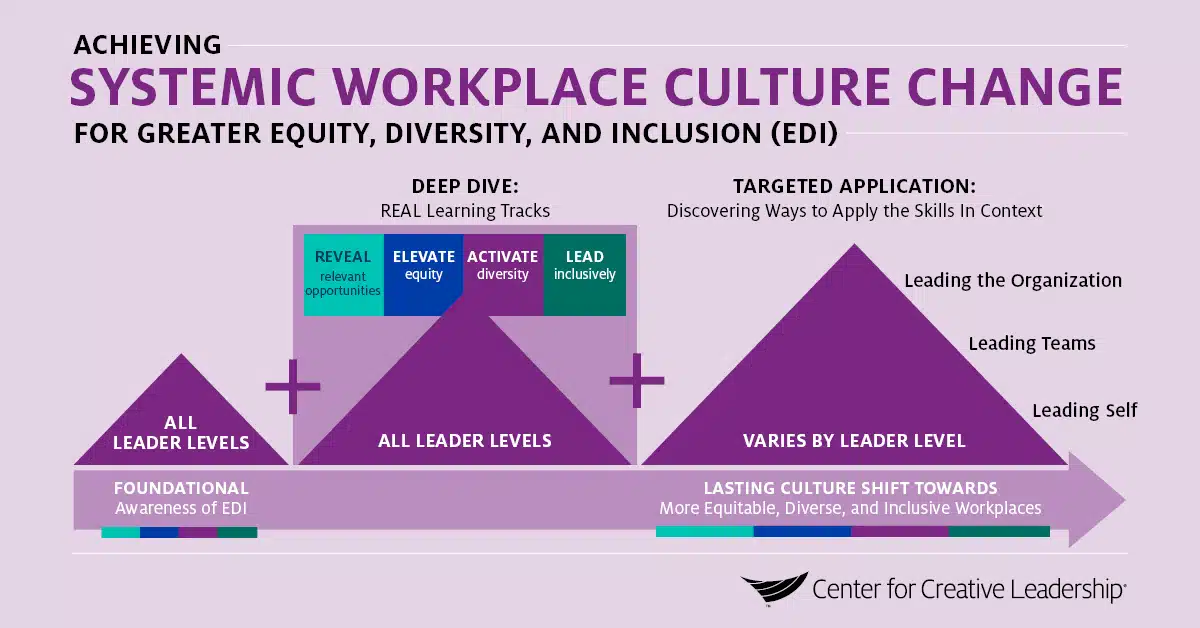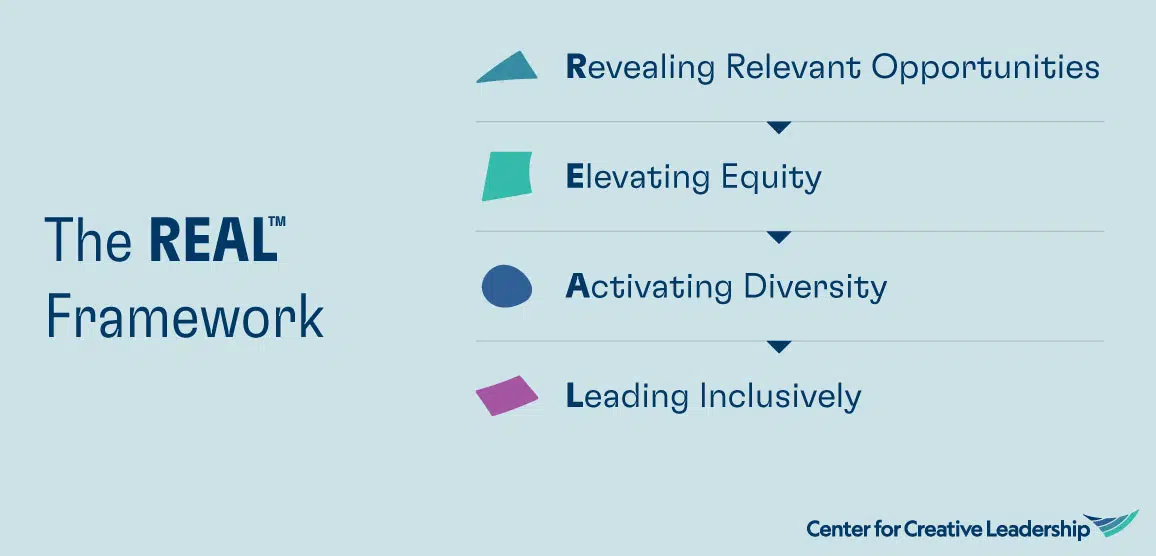By 2025, 75% of the global workforce will be millennials, which means many members of this group will be stepping into more leadership roles in the coming years. And we know from our research on emerging leaders that in order to attract and retain talent for the opportunities of the future, organizations need to be intentional and strategic about prioritizing equitable access to leadership, by investing in a systemic approach to change in workplace culture that promotes diversity and inclusion.
For a workplace culture change that’s rooted in Equity, Diversity, and Inclusion (EDI) to be successful and sustainable, leaders need to be willing to step back and assess the systems, processes, and values that drive the current culture. Senior leadership must be committed to taking ownership of the role they will play in creating and aligning new systems that will embed EDI into the workplace culture change process.
Without commitment and ownership from senior leadership, even well-intentioned workplace culture change initiatives intended to cultivate EDI are unlikely to create a lasting impact.
Systemic Change to Workplace Culture Requires a Systemic Approach
To successfully tackle equity and inclusion challenges and achieve meaningful workplace culture change, organizations must be willing to take a systemic approach their EDI efforts, assessing in multiple phases and at multiple levels.
Recent evaluations suggest that organizations have yet to hit the mark with their EDI efforts. A Glassdoor employee engagement survey found that Black employees are 8% less satisfied than their White colleagues — a discrepancy that has only widened since 2019. This figure indicates that organizational equity, diversity, and inclusion efforts may not align with what is happening internally on an individual or team level.
Additionally, women in the workplace have disproportionately been affected by the COVID-19 pandemic, resulting in a backslide of women’s progress in the workplace and negative implications for long-term gender equity and the wellbeing of women and families.
When working to achieve any systemic change in workplace culture, we recommend deploying a 3-phased approach:
- Phase 1: Define a clear landscape for success, by identifying the current state and any gaps or opportunity areas that exist.
- Phase 2: Use connected, aligned leadership to drive adoption of new mindsets and behaviors.
- Phase 3: Transition to a strong, sustainable, and systemic approach to change in culture, specifically designed to support your business strategy, and assess against the baseline to measure progress.
We know that leadership — individual, team, and organizational — drives culture, which can make or break a strategy, merger, or business transformation. Our 3-phased approach to systemic change in workplace culture helps your organization assess mindsets, behaviors, and attitudes that contribute to EDI by examining these aspects as they apply to individuals, teams, and the overall organization.
Achieving REAL Workplace Culture Change for EDI
Workplace culture change can only be sustained when the entire organization is involved in the process. Our proprietary REAL™ framework helps companies, communities, and schools understand the dynamics of EDI in their particular organization and context — and identify specific actions they can take to help them drive desired progress.
CCL’s REAL™ Framework
REVEAL relevant opportunities.
This first step is about discovery — not setting an agenda or duplicating diversity initiatives that seemed effective in other organizations. Using a curious and open mindset, leaders can begin to investigate facts, data, and history from a local, national, and global perspective and the context in which EDI plays out for individuals, teams, and the entire organization.
ELEVATE equity.
The next step in driving systemic change is to prioritize equity: the fair and contextually appropriate access to the resources and opportunities required for every individual and group to attain their full potential. To be sustainable, diversity and inclusion efforts must start with a focus on equity.
ACTIVATE diversity.
This step involves acknowledging and celebrating differences — and catalyzing the blend of characteristics, values, beliefs, experiences, backgrounds, and behaviors within the organization, or larger community.
LEAD inclusively.
The fourth — but not necessarily last — step is to envision and enact new ways of leading. Leading inclusively requires active, intentional, and ongoing efforts to promote the meaningful, authentic participation of, and investment in, every worker, customer, or strategic partner.
Learn more about our 4-step REAL framework in Ways to Take REAL Action on DEI (Diversity, Equity & Inclusion).
The framework also explores and explains how to apply EDI across the organizational spectrum, because lasting workplace culture change must include leaders at all levels — from individuals, to teams, to the entire organization, and it must be supported by senior leadership.
To build workplace culture, we must consider it within the context of these 3 tiers of leaders:
- Leading Yourself: Individual contributors or those managing their own contributions to the success of the business.
- Leading a Team: Being responsible for the results of a team and getting work done through others.
- Leading the Organization: Top-level positions in the organization where business results of multiple departments are the primary responsibilities.
Whether someone is leading themselves, a team, or an entire organization, we believe every individual holds the responsibility to enact workplace culture change within their own sphere as it relates to EDI.
The REAL framework provides a helpful way to understand EDI in context, as well as tangible leadership solutions to shift mindsets, behaviors, and practices towards more equitable and inclusive leadership for individuals, teams, and organizations.
Take a Sustainable & Systemic Approach to Changing Culture With Targeted Module Training
The challenges surrounding Equity, Diversity, and Inclusion can often be quite complex. At CCL, we’ve designed learning modules that tackle this complexity step by step, and are applicable to all levels of the organization:
- To build foundational knowledge around what Equity, Diversity, and Inclusion really means, we have an introductory workshop that equips leaders with awareness around the behaviors and actions of “a REAL leader” who actively supports equity, diversity, and inclusion to the fullest extent possible from within their own sphere of influence.
- From there, we offer a series of training modules for all leader levels that allow individuals to understand each of the components of the REAL framework. Our engaging modules include a 3-hour deep dive into each of the components of the model, giving leaders the opportunity to learn about and practice important skills as a REAL leader.
- Then, we’ve built one-hour application components to allow leaders to begin applying these skills within their worlds — whether they’re leading themselves, leading a team, or leading the entire organization.

For example:- In the module aimed at Revealing Relevant Opportunities When Leading Yourself, participants are encouraged to share a snapshot of their world as it relates to EDI — either personally or professionally — in an effort to discover more about the relevant opportunities they are currently facing. Together, using context, curiosity, and appreciative inquiry, individual contributors are able to discover more about possible new actions they can take to support EDI from where they sit, and potential outcomes.
- In the module aimed at Activating Diversity When Leading the Team, team leaders create a social identity network map, identifying potential obstacles or challenges, and creating specific actions to activate more diversity through 3 system levels within their teams.
- In the module intended to help executives Lead Inclusively When Leading the Organization, participants are asked to evaluate their organization’s inclusivity efforts in 3 areas — strategy, talent engagement, and work environment. Senior leaders assess the success of their inclusivity efforts in those 3 dimensions, and identify where they hope to be. They then work with their group to create a strategic plan rooted in the drivers of inclusion — connection, courage/vulnerability, and resources/investment.
Take EDI Initiatives From Planning to Action for Lasting Workplace Culture Change
Unfortunately, many organizations’ commitments to equity, diversity, and inclusion just aren’t translating into desired results and sustainable, systemic change.
People need new ways to think about and talk about diversity; leaders need new skills to enable equity and inclusion in the workplace; and organizations need scalable ways to ensure that their diversity and inclusion initiatives avoid common mistakes and are both solid and sustainable.
Our proprietary REAL framework and targeted training modules can help companies equip individuals at every level to understand the dynamics of EDI within their particular place in the organizational context — and identify specific actions each leader can take to help drive desired results, supporting greater equity, diversity, and inclusion across the enterprise.
Ready to Take the Next Step?
We can partner with you to create lasting workplace culture change in your organization and shift mindsets, behaviors, and practices towards a more equitable, diverse, and inclusive future. Learn more about our equity, diversity, and inclusion practice and solutions.









